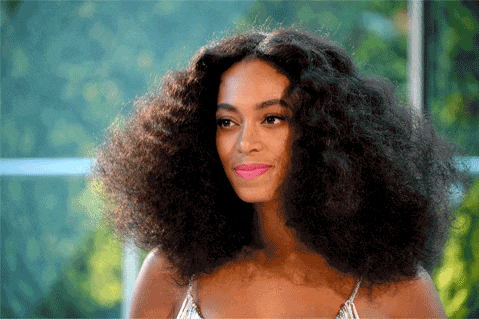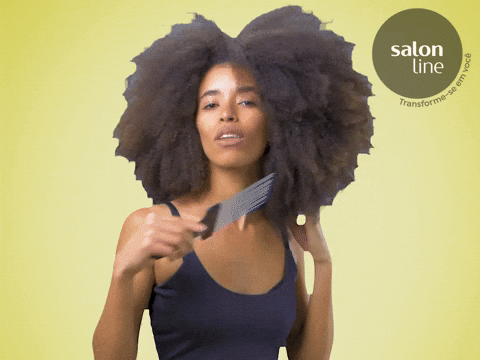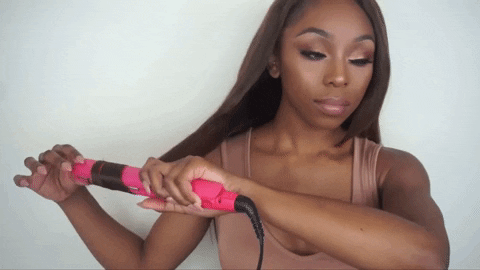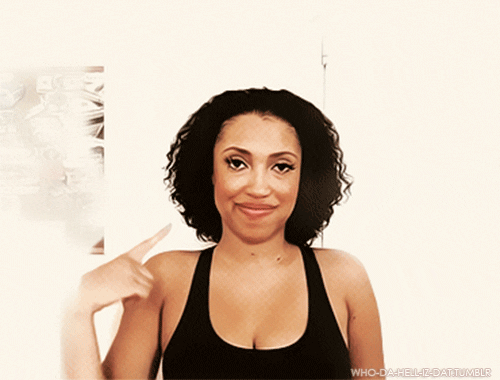
Everything related to COVID-19 has been a hot mess and a ball of stress. From losing clients and being stuck in the U.S. to having to cancel events and even coping with the death of someone I know---life's been more than challenging these past few months. When I'm not trying to pick up the pieces of my broken travel plans and confused bank account, I'm juggling virtual appointments with my therapist, course assignments for my master's program, incessant Zoom meetings and event invites, and thoughts of saying to hell with it all.
I can definitely empathize with the millions of others in the same boat as me.
So please, bruh… sis, just know this: When outside fully opens for all of us, don't expect me to join you at that brunch table, on the cruise trip, or even for worship service. I don't care how many masks, sprays, and reassurances are given. Ya girl won't be in the building. Period.
I know some states and countries have lifted some restrictions, and people are out and about, but I'll still be self-isolating until I feel super comfortable deep down in the pits of my soul to join the masses again. Hey, I won't shame you or try to convince you to do the same. I'll just let you know 5 reasons why I'm choosing caution over comfort:
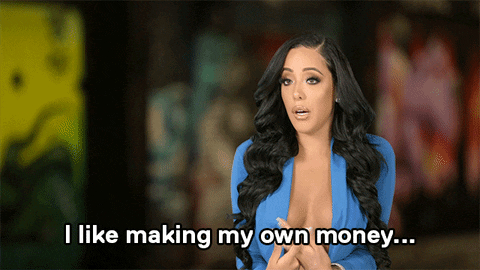
Image via Giphy
1. I've found career direction, money savvy, and discipline by staying inside.
Initially, I was very depressed and angry about being forced to remain in the same place for an extended period of time. (I mean, it's one thing to make a choice not to go anywhere. It's another for borders to be closed.) I also, obviously, did not like the initially negative impact COVID-19 had on my income streams. However, time at home has forced me to center my thoughts, get more creative, and reevaluate the services I offer and who I offer them to.
When you're distracted by too many choices, you sometimes get so caught up in it all that you lose sight of your long-term goals and what truly makes you happy. I thought I'd escaped the rat race of a 9-to-5 by going freelance full-time, but I found myself on another hamster wheel of entrepreneurship that wasn't really serving me. One client loss actually led me to a realization about a service I offer that I don't even enjoy doing---one that wasn't bringing in much money to begin with. COVID-19 forced me to essentially let go of dead weight and reevaluate the return on investment of time and energy.
I've also consulted branding managers, revamped my Website, got a new therapist, attended cool virtual events (that I would've been too busy to consider attending in-person), and found other skills I can market to make a coin. I think I have more self-work and re-focusing to do, so inside I'll be for a little while longer.
2. I can contribute to the good of the environment.
While I know governments have to make tough decisions that affect society as a whole, I can make my own choices about my body, my health, and my safety. Some of the affects of quarantine have been positive for the environment anyway. Experts have found that pollution and greenhouse gas emissions have decreased since the pandemic began, and though the positive effects might subside, this is good news for now.
Just because quarantines are lifted and businesses can open doesn't mean I have to immediately go back to life as usual. There's no law that says I have to go outside when everything opens up again. It's that simple.
I'm not an essential worker, my line of work can be done from anywhere that has WIFI and electricity, and I think it will be helpful to the community as a whole to help lessen the load of accommodating so many people who will be flooding the streets.
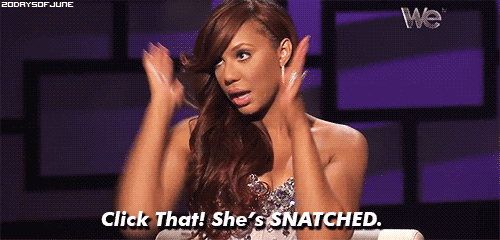
Image via Giphy
3. I've adopted healthier habits and lost weight.
Yep, even with all the take-out and delivery food. Before the nationwide quarantine and business closures, I loved going out to eat and I only worked out when I felt like it. I'd have a meal at a restaurant at least three times a month. I enjoy the experience of having a chef cook and not having to do dishes or shop for groceries. When quarantines were mandated, I craved restaurant food, so I'd order delivery or takeout. Sadly, many restaurants are ill-equipped or lack proper infrastructure for effective delivery service, even when partnering with third-party apps.
After two very popular delivery platforms utterly disgusted me---offering cold, low-quality food, horrible drop-offs, and high fees---I decided to fast. I initially did two weeks---for the first, only water and tea, and the second, soups and liquids.
I really didn't start the fast to lose weight since fasts, for me, are related to spiritual and mental health, however, it doesn't hurt that I've lost 10 lbs so far.
I plan to continue. It's my way to take focus off unhealthy eating habits, detach from relying on restaurant meals, and release anger about wasted time and money. I plan to go vegan for a while once I break my fast (another lifestyle change I've done in the past and enjoyed).
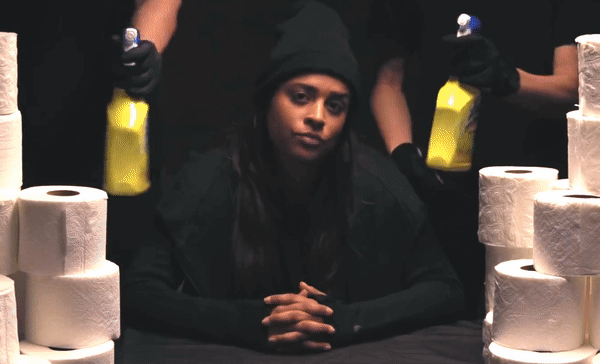
Image via Giphy
4. I was a germ-conscious introvert before COVID-19, and being so has suited me just fine.
No shade to people who are the total opposite---again, this is not to shame anyone for how they choose to live their lives---but I can count on one hand how many times I've been hospitalized or even extremely sick. I have always been a big fan of staying home if there are any semblance of symptoms of any sort of contagious ailment such as the common cold or flu. I was that kid who would not share food or candy with anybody, and don't get me started on toilet seats, cups, and utensils. I'm notorious for not letting people do things like dip their hands in a bag of chips or double dip a spoon in a sauce or soup.
I'm still a bit of a germaphobe---someone who doesn't allow "outside clothes" on or in my bed, washes clothing (no matter the color) in hot water, wears shower shoes in bathtubs I didn't clean myself (yes, even at hotels), and keeps handy bottles of sanitizer in my purse, in my car, and in almost every cupboard of the house.
After more than a decade of living in New York, falling victim to bedbugs from an apartment rental gone bad, and having a major health scare in my late teens, I stepped up the sanitation and germ-conscious game and never looked back. And I know, sis, I know: There are people who have done it all and still, unfortunately, got sick. However, experts have said, time and time again, that the more you can lessen exposure to germs and bodily fluids, the better your chances are of staying healthy.
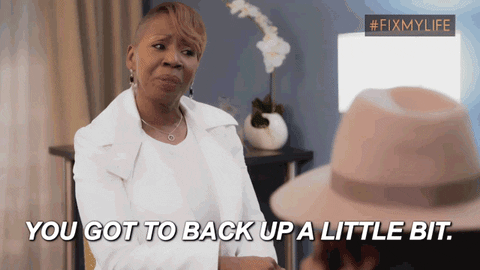
Image via Giphy
5. I need more evidence of a lower risk of contracting COVID-19.
So many stories are going around about the risks of getting COVID-19, the strain its caused for the healthcare system, and how a "mutant" version of it is anticipated to emerge in the near future. I'm not one to live by fear, but survivors of the virus have even said they do not think it a good idea to reopen businesses and reschedule recreational activities with groups so soon. And though there are vaccines under development, there is no vaccine readily available to the average consumer, according to reports.
A simple trip to the store for essentials has shown me that many don't follow directions and won't respect the six-foot advisement of social distancing anyway. I still see people gathering in groups conversing with no masks, people not washing their hands or using hand sanitizer, people using their bare hands to test fruits and vegetables, people coughing or sneezing without covering their mouths or using the inside of their elbows… I could go on and on. Even if I chose to do some of my favorite things outdoors--- sit on a beach, read at the library, have a meal on an outdoor veranda, or get on a plane---I can't do it with 100-percent confidence that I won't have an anxiety attack or be exposed to the virus.
Folks, I'd rather be safe than sorry, and to be honest, going back to life as usual for a brunch date, movie night or overseas trip just isn't in the cards for me right now. I will continue to pray, sanitize, self-isolate, self-motivate, and take things as slowly as I feel comfortable doing.
Want more stories like this? Sign up for our newsletter here to receive our latest articles and news straight to your inbox.
Featured Image via Shutterstock
This Is How To Keep 'Holiday Season Stress' From Infecting Your Relationship
Hmph. Maybe it’s just me, but it seems like there is something really weird happening in the fall season air (because winter doesn’t officially begin until December 21) that cuddle season is in full swing while break-up season is as well. In fact, did you know that break-ups are so popular during the holiday season that December 11 is deemed Break-Up Day?
The reasons why relationships shift around this time vary; however, I did both roll my eyes and chuckle when I read that a very popular one is because it’s an easy way to get out of getting one’s significant other a Christmas present. SMDH.
Anyway, I personally think that the less shallow folks out here may contemplate calling things “quits” or they at least distance themselves a bit from their partner (and what I’m referring to is serious relationships) due to all of the stress and strain that oftentimes comes with the holidays whether it be financial, familial, due to their tight schedules or something else.
Listen, I would hate for you and your man to miss the fun and happiness of experiencing this time of year, all because you are so overwhelmed or irritated that you can’t really enjoy it. That’s why I have a few practical tips for how to avoid allowing the typical holiday season stress from INFECTING your relationship.
Manage Your Expectations
 Giphy
GiphyUnmanaged expectations. If there is a main reason why the holiday season tends to be so stress-filled for so many people, I’d bet good money that this is the cause. And when you’re in a long-term relationship, expectations can manifest themselves in all sorts of cryptic and/or unexpected ways. You might have relatives who assume that you are going to be with them for Thanksgiving or Christmas when you have other plans in mind. You might be thinking that you are going to spend one amount for presents while your man is thinking something totally different. When it comes to scheduling, your signals may be crossed.
And you know what? To all of these scenarios, this is where clear and consistent communication come in. Don’t assume anything. Don’t dictate anything either. From now until New Year’s, mutually decide to check in once a week, just to make sure that you are both on the same page as it relates to the holidays and what you both are thinking will come along with it. The less blindsided you both feel, the less stressed out you will be. Trust me on this.
Set (and Keep) a Budget
 Giphy
GiphyOkay, so I read that last year, 36 percent of Americans incurred some type of holiday-related debt. Hmph. Last year, there was still some sense of normalcy in this country, chile, so I can only imagine what finances are gonna look like over the next several weeks. That said, since I don’t know a lot of people who don’t find being broke stressful, make sure that you and your bae set a budget and then stick to it this year — no ifs, ands or buts.
Because really, y’all — it doesn’t make sense to deplete savings and/or max out credit cards for a few days of giggles only to be damn near losing your mind because you don’t know how to make ends meet come Dr. Martin Luther King, Jr. Day.
And by the way, this tip doesn’t just speak to things like food and gifts; I also mean travel. If it doesn’t make a ton of sense (or cents) to be all over the place this year — DON’T BE.
Keep Matthew 5:37 at the Forefront
 Giphy
GiphyIf off the top of your head, you don’t know what Matthew 5:37 says, no worries, here ya go: “But let your ‘Yes’ be ‘Yes,’ and your ‘No,’ ‘No.’ For whatever is more than these is from the evil one.” That verse right there? Oh, it’s a boundaries lifesaver! I say that because do you see “maybe” or “I’ll think about it” in there? Nope. LOL. It says that you should tell people “yes” or “no” and leave it at that — and that complements Anne Lamott’s quote, “’No’ is a complete sentence” impeccably well. Yeah, you’ve got to remember that anything beyond a yes or no to a request is privileged information; you don’t owe anyone details or an explanation.
Besides, if you are really honest with yourself, when someone asks you something and you give a “Umm, let me think about it” kind of reply, more times than not, you already know what your answer is going to be — so why not let you both off of the hook? Give your response. Commit to that. And let everyone (including yourself) get on with their lives and schedules.
I promise you that when it comes to those holiday parties, you are pissing more folks off by not RSVP’ing or doing so and not showing up than just saying, “Thank you but not this year” off the rip.
Remember That Your Personal Space Is Privilege Not a Right
 Giphy
GiphyA friend of mine recently bought a new house and invited me over to come see it. He’s a single man with no children, so as I was taking in all of the space that he had, especially as I walked through his finished basement, I joked about relatives coming to live with him. “Hell no” and “absolutely not” were pretty much his immediate responses as he went on to say that some folks even had the nerve to be offended when he told them that he had no intentions on taking DNA in.
Ain’t it wild how people think that your stuff is their right? And yes, that brings me to my next point. Your home is your sanctuary space. If you want to host folks this year — cool. If not, ALSO COOL. Please don’t let folks (family included) guilt you into how they want you to act or even into what they would do if the shoe was on the other foot. You are not them — and as one of my favorite quotes states, “If two people were exactly alike, one of them would be unnecessary.” (A man by the name Larry Dixon said that.)
Hell, my friends? They know that I am good for sending them random things that they need or even want all throughout the year. Coming over to hang out at my pace, though. Uh-uh. Chalk it up to being a card-carrying member of the ambivert club yet I like keeping my living space personal — and I sleep like a baby, each and every night, for feeling that way.
Always remember that your space, your time, your resources, your energy and shoot, yourself period (including your relationship), are all things that are your own. You get to choose how, when and why you want to share them. The holiday season is certainly no exception.
Cultivate Some “You Two Only” Traditions
 Giphy
GiphyIt’s not uncommon for some couples to hit me up after the holiday season to “detox.” Sometimes it’s due to the financial drama (and sometimes trauma) that they experienced. Sometimes it’s because they allowed their relatives (especially in-laws) to get more into their personal business than they should’ve. More than anything, though, it tends to be because they didn’t get enough quality time together and so ended up feeling “disconnected.”
Please don’t let that happen. Listen, I’m not even a holidays kind of woman and yet, I will absolutely sit myself down with some hot chocolate and chocolate chip cookies to enjoy a Hallmark holiday film or two. Aside from the fact that most of them are lighthearted and sweet, I also like that they usually focus on couples loving on each other amidst all of the holiday beauty and ambiance — which is something that all couples should set aside some time to do.
Maybe it’s a vacation. Maybe it’s a staycation. Or maybe it’s my personal favorite, A SEXCATION. Whether it’s for a few days, the weekend or even overnight — don’t you let the holidays go by without setting aside time for you and your man to celebrate one another. Don’t you dare (check out “Are You Ready To Have Some Very Merry 'Christmas Sex'?”).
GET. SOME. REST.
 Giphy
GiphyI once read that 8 out of 10 people get stressed out over the holidays and 3 out of 10 lose sleep during to it — and when you’re stress-filled and sleep-deprived, that can absolutely lead to hypersensitivity, making mountains out of molehills and even not being in the mood for sex.
Your relationship can’t afford to go through any of this, so definitely make sure to prioritize rest. I don’t care how unrealistic it might seem during this time, sleep should never be seen as a luxury; it will always and forever be a great necessity.
That said, try to get no less than six hours of shut-eye in (check out “6 Fascinating Ways Sex And Sleep Definitely Go Hand In Hand”) and even ask your bae to take a nap with you sometimes (check out “Wanna Have Some Next-Level Sex? Take A Nap, Sis.”). Not only will sleep help to restore your mind, body and spirit but, when it’s with your partner, it’s an act of intimacy that can make you both feel super connected, even in the midst of what might feel like chaos.
___
Holiday season stress is real. Still, never give it the permission or power to throw your relationship off. Put you and your man first and let the holidays be what they are gonna be, chile.
Let’s make things inbox official! Sign up for the xoNecole newsletter for love, wellness, career, and exclusive content delivered straight to your inbox.
Featured image by Shutterstock
It’s probably been over the past 2-3 years that I’ve become hyper-focused when it comes to applying certain chemical exfoliants known as acids to my skin. Personally, I’ve come to really appreciate ones like mandelic acid and hyaluronic acid because they have a way of softening my skin, brightening it up and really evening out my complexion overall.
In fact, on my skin, they have been so effective that they have caused me to wonder what would happen if I applied some of them to my hair too — and boy, was it an experiment that paid off big time!
If, while on your continual journey to get the best out of your own tresses, you’d like to learn how to get them healthier than it’s ever been, I’ve got seven acids that are typically known for skin use that can be just as beneficial to your hair as well.
1. Salicylic Acid
When it comes to your skin, salicylic acid is beta-hydroxy acid that is great for your skin if you’re looking for something that will exfoliate it, clear out your pores and dissolve dead skin cells. In fact, this is why it’s an acid that is quite popular when it comes to treating acne.
Your hair will enjoy salicylic acid because, if you’re looking to remove product build-up, you want to soothe an itchy or irritated scalp or you’ve got some dandruff flakes that are totally driving you up the wall, salicylic acid has the ability to treat all of this. Either purchasing a shampoo that contains this ingredient or adding it to your favorite scalp scrub is probably the most effective way to get the most out of it.
Just make sure that if your scalp is sensitive or dry that you approach with caution. In these instances, it could end up irritating your scalp more than helping it out, so use a very little bit in the beginning to make sure that it vibes with you.
2. Lactic Acid
Lactic acid is an alpha hydroxy acid that can help to even out your skin tone as well as slow down the signs of aging. The properties in it help to do this by reducing hyperpigmentation and boosting collagen production in your skin as well as keeping it hydrated.
Why is it great for your locks? For one thing, lactic acid is considered to be a humectant. This means that it pulls water from the air so that your hair is able to remain moisturized.
Another thing that makes it a winner is the fact that lactic acid breaks down dead skin cells on your scalp (so that your hair follicles are able to flourish), it can help to soften and detangle your hair (making it a helpful addition on your wash days) and it also helps to protect your tresses from heat styling tools and UV damage. Applying a hair rinse that’s made up of part lactic acid and part water can work wonderfully (so long as you apply it once a month, tops; more than that might be too “intense” for your hair strands).
3. Glycolic Acid
Glycolic acid is a water-soluble alpha hydroxy acid that is actually made from sugar. Your skin will adore it because it smooths the appearance of fine lines and wrinkles, improves the texture of your skin, gently exfoliates, clears your pores and brightens up your complexion overall.
The reasons why you should consider this acid for your hair is because it helps to keep your scalp youthful (and yes, there is such a thing; check out “Your Scalp Ages Six Times Faster Than Your Face. Why It Matters.”), removes excess sebum (that could be clogging up your hair follicles) and it helps to keep your hair moisturized. Your best bet here is to make it a part of your pre-shampooing ritual.
4. Succinic Acid
Succinic acid is an acid that is made from sugar cane and contains antimicrobial and anti-inflammatory properties. Although it doesn’t exactly exfoliate (like many of these other acids do), it can still be beneficial to your skin when it comes to reducing the kind of irritation that is associated with eczema, decreasing the bacteria that leads to breakouts and keeping your skin pretty hydrated.
As far as your hair goes, this is an acid that is worth trying out because it helps to balance the sebum that is on your scalp, remove dead skin and product build-up that can irritate your scalp and clog your hair follicles and, succinic acid is also beneficial when it comes to reducing dandruff and helping to prevent hair loss. Most people tend to apply this as a serum.
5. Hyaluronic Acid
I’ve officially sung the praises of hyaluronic acid on this platform before. One example is via the article, “Why Your Skin, Hair, And Nails Need Hyaluronic Acid Like...Yesterday.” On the skin tip, hyaluronic acid is great because it deeply hydrates your skin, contains anti-aging properties and can even bring relief to vaginal (including vulvar) dryness.
Your hair will adore this particular acid because it aids moisture to it (including your hair follicles), will help to improve your hair’s texture and it also soothes scalp dryness, nurtures the cuticles of your tresses and decreases frizz. Using a serum rich in this acid as a pre-poo or as a leave-in conditioner is recommended.
6. Azelaic Acid
If you’ve never heard of azelaic acid before, this is your lucky day. It’s a dicarboxylic acid that, when it comes to skincare (and hair care) products, is usually synthetic. Anyway, if you are looking for a way to reduce inflammation, even skin tone after a breakout or if you want to use an exfoliant that will improve the texture of your skin overtime, you might want to give this acid a shot.
This one makes the list as far as your hair is concerned because, if achieving more inches is your current focus, azelaic acid might come in handy. That’s because it is able to strengthen your hair, thicken your strands and also stimulate hair growth from within your hair follicles.
7. Glutamic Acid
Glutamic acid is actually a type of amino acid. Skin-wise, it’s great for deeply hydrating your skin as well as protecting it from pollutants and damaging UV rays. Also, if you’re looking for an acid that treats skin dryness or “tightness,” this could be the answer to your prayers.
Since glutamic acid is also considered to be a humectant, it’s another acid that can moisturize your hair. As a result, it can decrease breakage while helping your hair to feel smooth and look shiny.
BONUS: Amino Acids
Speaking of amino acids and hair, please try to keep some amino acids in your diet at all times. The reason why is because, since your hair is made up of mostly protein (keratin, to be exact), amino acids are pretty darn effective when it comes to helping you to maintain the overall health and well-being of your hair.
Ones to prioritize include proline (it boosts collagen so that your hair strands can maintain flexibility); arginine (it increases blood flow to your hair follicles so that they can receive the nutrients that they need); cysteine (it helps to keep your hair follicles healthy); alanine (it helps your system to produce more collagen), and isoleucine (it strengthens the tissues that help to make up your hair strands). All of these are available in supplement form or you can use Google to see which foods contain them.
___
Although it might initially seem odd to apply acid to your hair, as you can see, certain ones will work miracles for it. So, test them out to see which one tickles your fancy.
Hell, since they work for your skin as well — it’s a two-for-one deal that is worth every penny!
Let’s make things inbox official! Sign up for the xoNecole newsletter for love, wellness, career, and exclusive content delivered straight to your inbox.
Featured image by Shutterstock










